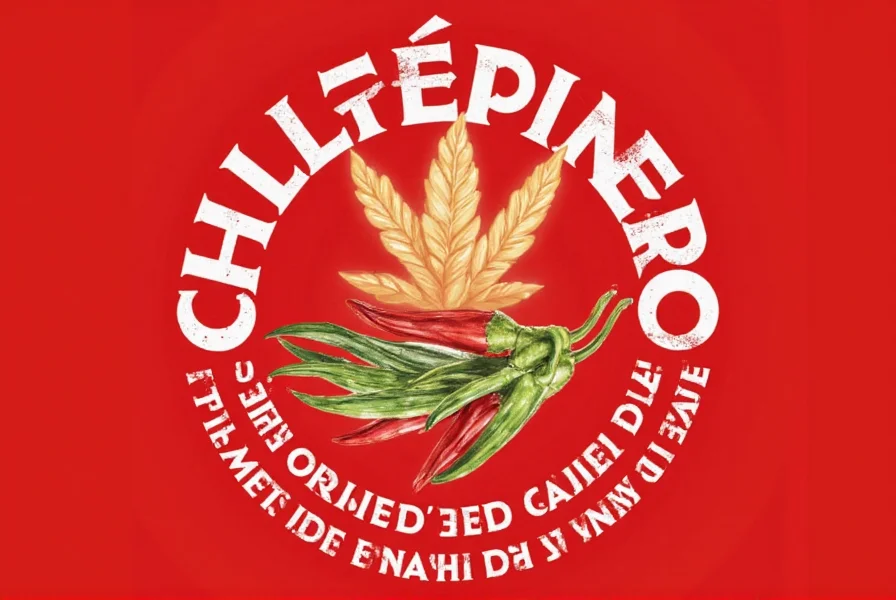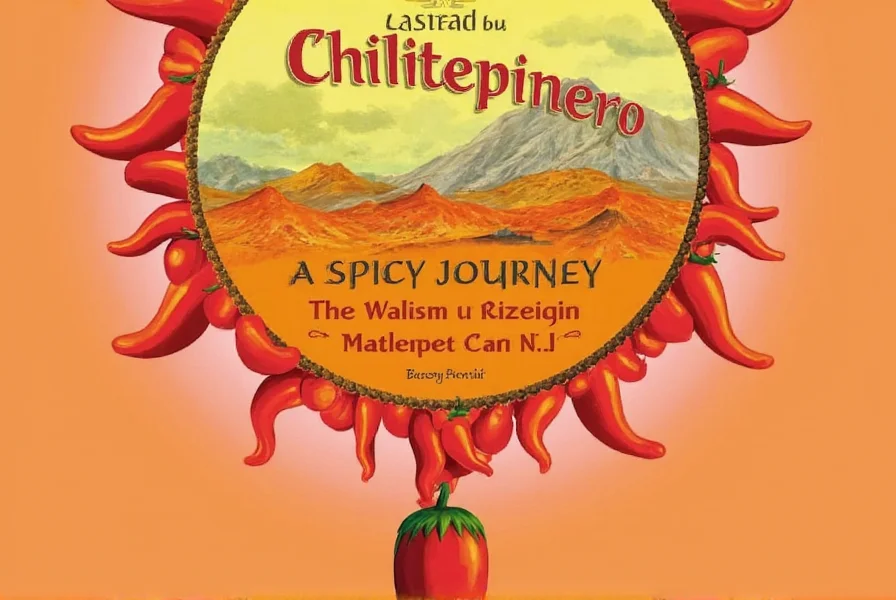Table of Contents
What is Chiltepinero? Key Facts and Origins
Chiltepin pepper (Capsicum annuum var. glabriusculum), commonly referred to as "chiltepinero," is a small but intensely hot chili pepper native to Mexico's Sonoran Desert region. According to the United States Department of Agriculture (USDA) and Mexican agricultural research, this pepper has a Scoville Heat Unit (SHU) range of 50,000 to 100,000, placing it between jalapeños and habaneros in heat intensity. Its unique flavor profile combines fruity notes with a sharp, lingering heat, making it a staple in traditional Mexican cuisine.

Unlike its close relative the bird's eye chili, chiltepin has a distinct taste profile and is often used fresh or dried in salsas, marinades, and hot sauces. The name "chiltepin" originates from Nahuatl, meaning "little chili," reflecting its small size but significant impact on flavor.
Spice Basics: What You Need to Know
The Scoville scale measures chili pepper heat, with chiltepinero consistently ranking between 50,000-100,000 SHU. For comparison: jalapeños (2,500-8,000 SHU), serranos (10,000-23,000 SHU), and habaneros (100,000-350,000 SHU). This places chiltepinero at a moderate-to-high heat level that delivers complex flavor without overwhelming most palates.
Key characteristics include:
- Fruity undertones: Distinct tropical notes when fresh, enhancing savory dishes
- Quick heat release: Heat builds rapidly but dissipates faster than habaneros
- High capsaicin concentration: Concentrated in seeds and inner membranes
- Traditional use: Essential in Sonoran and Sinaloan Mexican cuisine for authentic flavors
Practical Tips for Working with Chiltepinero
Follow these expert recommendations for safe and effective use:
- Start with minimal amounts: One pepper can season an entire pot of chili
- Always wear gloves: Capsaicin causes skin irritation that lasts for hours
- Roast for depth: Dry-roasting enhances smoky notes while reducing raw heat by 20-30%
- Pair with dairy: Yogurt, cheese, or avocado neutralizes heat effectively
- Use precision tools: Microplane grater for controlled heat distribution in sauces
| Feature | Why It Matters |
|---|---|
| Appearance | Look for bright red, plump peppers without mold or wrinkles. Fresh chiltepineros should have glossy skin and firm texture. |
| Smell | Should have a clean, grassy aroma. Sour or musty smells indicate spoilage. |
| Texture | Firm skin with slight give when gently squeezed. Avoid soft or shriveled peppers. |
| Heat Level | Check for "mild" or "extra hot" labels. Heat varies by growing conditions and harvest time. |
| Origin | Peppers from Sonora, Mexico, are considered highest quality due to ideal growing conditions. |
For long-term storage, freeze whole peppers in airtight containers or dry them in a dehydrator at 135°F (57°C) for 12-24 hours. Dried chiltepineros retain 90% of their heat and flavor for up to 12 months.
Culinary Uses and Pairings
Chiltepinero's versatility extends beyond traditional Mexican dishes:
- Authentic salsa: Blend with tomatillos, cilantro, and lime for "salsa de chiltepin" (a Sonoran specialty)
- Marinades: Infuse tequila or vinegar with whole peppers for 48 hours before straining
- Chocolate desserts: Add 1/4 teaspoon ground chiltepin to dark chocolate sauces for complex heat
- Seafood seasoning: Sprinkle dried powder over grilled shrimp or ceviche
- Hot sauce base: Combine with pineapple and apple cider vinegar for fruity, balanced heat

Pro pairing tips:
- Citrus (lime, orange) enhances fruity notes
- Creamy ingredients (avocado, queso fresco) balance heat
- Smoky elements (chipotle, smoked salt) complement its natural profile
Frequently Asked Questions
What is the difference between chiltepin and chiltepinero?
"Chiltepin" refers to the wild variety (Capsicum annuum var. glabriusculum), while "chiltepinero" typically describes cultivated strains. Wild chiltepins are smaller (3-5mm) and hotter (up to 150,000 SHU), while cultivated varieties average 50,000-100,000 SHU with more consistent flavor. Both belong to the same species but differ in growing conditions and characteristics.
How hot is the chiltepinero on the Scoville scale?
Chiltepinero consistently ranks between 50,000-100,000 Scoville Heat Units (SHU), making it 5-20 times hotter than jalapeños but milder than habaneros. Heat levels vary based on growing conditions - drought-stressed plants produce higher capsaicin concentrations. For reference, the USDA confirms this range in their agricultural databases.
How should I store chiltepinero peppers to maximize freshness?
Fresh peppers: Store in a paper bag in the refrigerator's vegetable drawer for 10-14 days.
Freezing: Place whole peppers in airtight containers for up to 6 months (no thawing needed for cooking).
Drying: Dehydrate at 135°F (57°C) for 12-24 hours, then store in opaque containers away from light. Properly dried chiltepineros maintain quality for 12 months.
What should I do if chiltepinero burns my skin?
Immediately wash with soap and cool water. For persistent burning:
- Apply full-fat milk or yogurt (capsaicin is fat-soluble)
- Use a baking soda paste (1 tsp baking soda + 1 tsp water)
- Avoid water alone, as it spreads capsaicin
- For eye exposure, rinse with saline solution and seek medical attention
Can chiltepinero peppers be grown outside of Mexico?
Yes, but only in USDA zones 9-11 (minimum 60°F/15°C). They require:
- Well-draining sandy soil
- Full sun exposure (6-8 hours daily)
- Protection from frost
- Consistent watering without waterlogging
Container gardening works in cooler climates. The USDA Agricultural Research Service confirms successful cultivation in Arizona, Texas, and Florida with proper care.
What are traditional Mexican dishes that use chiltepinero?
Chiltepineros are essential in:
- "Salsa de chiltepin" (Sonoran-style salsa served with seafood)
- "Machaca" (dried meat dishes)
- Traditional "raicilla" spirit production
- "Chiles rellenos" for added heat
- Pickled condiments for tacos and grilled meats
These dishes originate from Mexico's Sonora and Sinaloa regions, where chiltepin has been cultivated for centuries.
Is chiltepinero the same as bird's eye chili?
No. Key differences:
- Species: Chiltepin = Capsicum annuum; Bird's eye = Capsicum frutescens
- Origin: Chiltepin = Mexico; Bird's eye = Southeast Asia
- Heat profile: Chiltepin has fruity notes; bird's eye has sharper, cleaner heat
- Size: Chiltepin is smaller (3-5mm) and rounder
- Traditional use: Chiltepin is used fresh in Mexican cuisine; bird's eye is typically dried for Asian dishes
The Chile Pepper Institute confirms these distinctions in their botanical classification system.
Conclusion: Why Chiltepinero Belongs in Your Kitchen
Chiltepinero offers a unique balance of fruity flavor and controlled heat that elevates dishes without overwhelming them. Whether you're making authentic Mexican salsa, experimenting with chocolate desserts, or creating signature hot sauces, this pepper delivers consistent results when handled properly.
Key takeaways:
- Always use gloves when handling fresh peppers
- Start with minimal amounts and adjust to taste
- Pair with citrus and dairy to balance heat
- Store properly to maintain peak flavor
- Explore traditional Sonoran recipes for authentic experiences
With its rich cultural history and versatile culinary applications, chiltepinero deserves a place in every spice enthusiast's collection. As the USDA confirms, this small pepper packs significant flavor potential when used with proper knowledge and technique.










 浙公网安备
33010002000092号
浙公网安备
33010002000092号 浙B2-20120091-4
浙B2-20120091-4